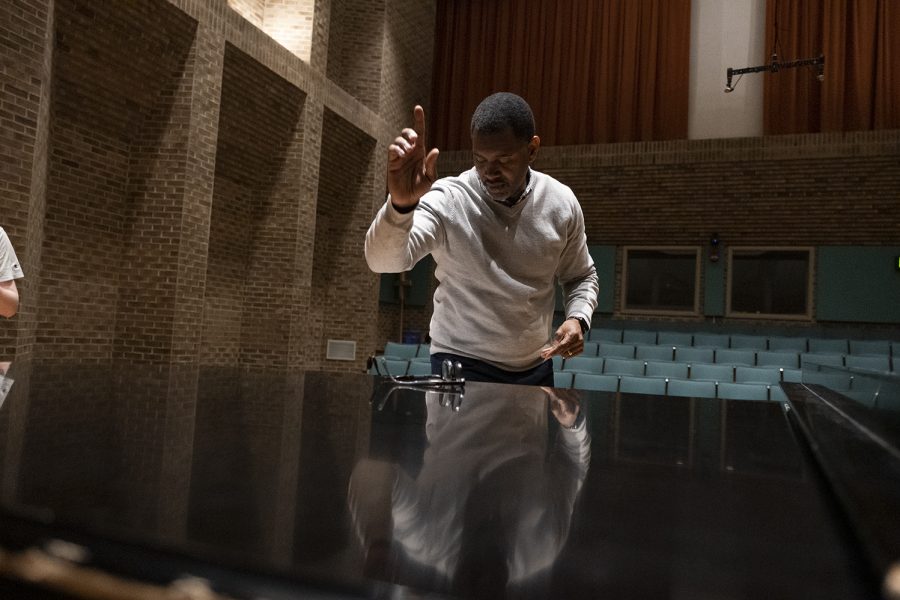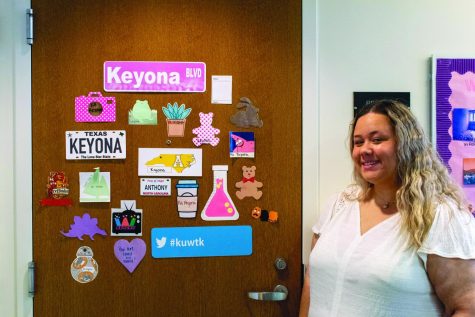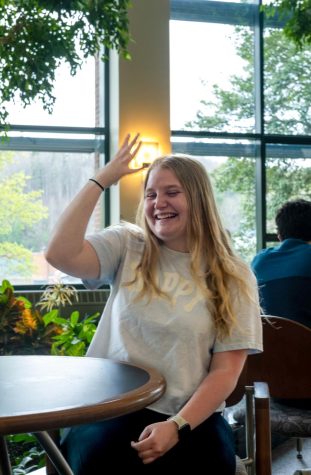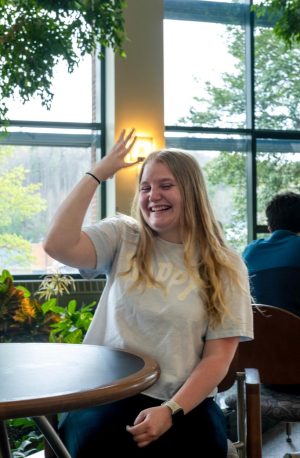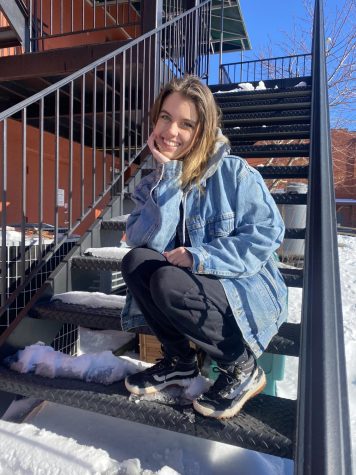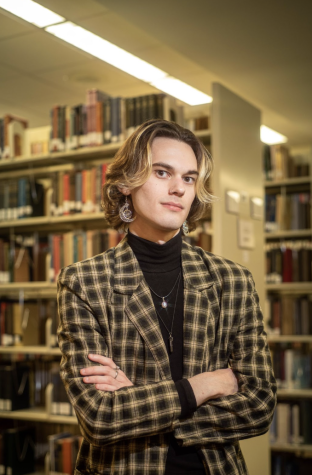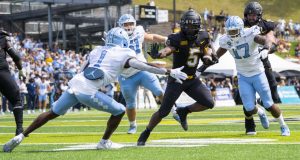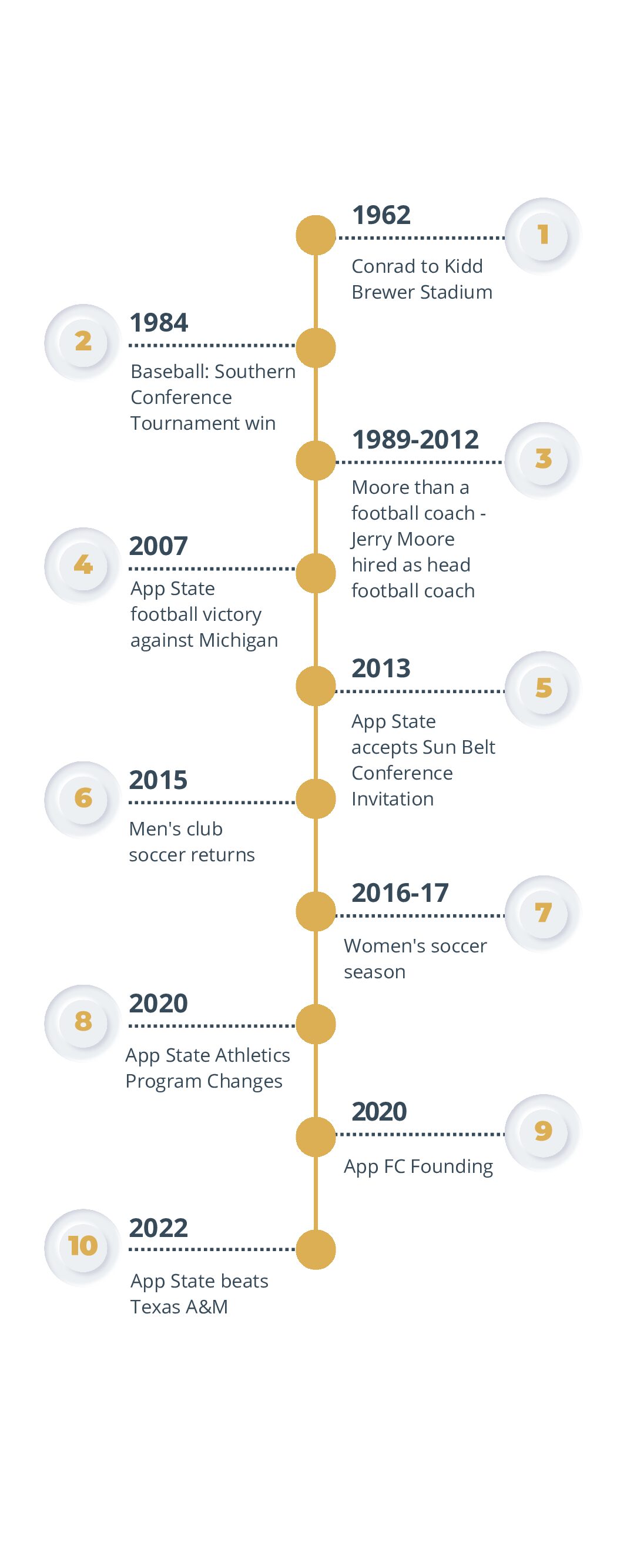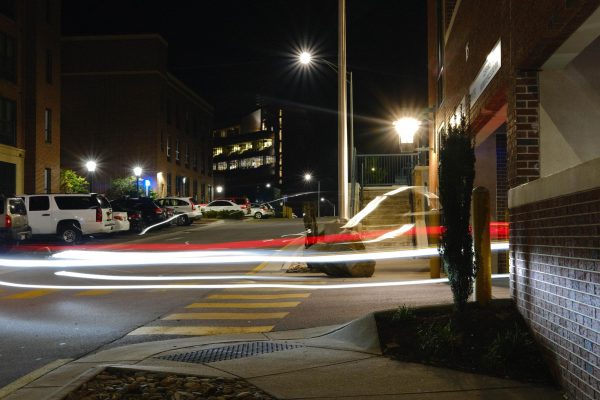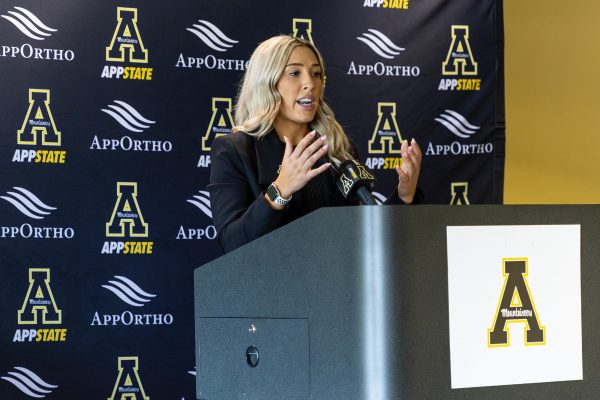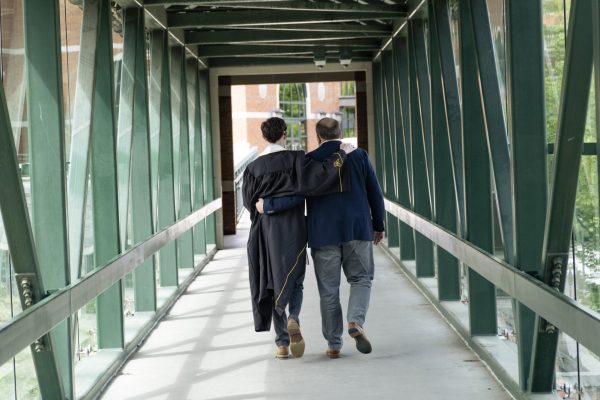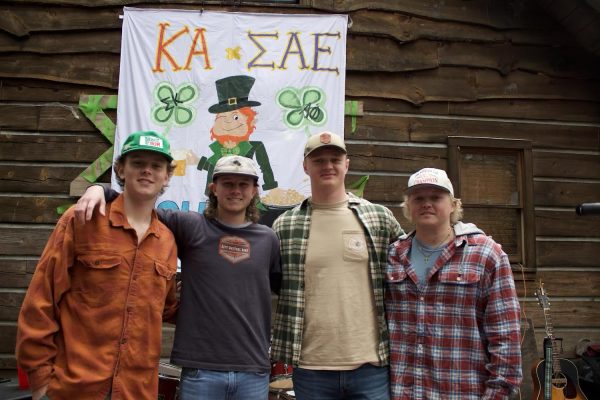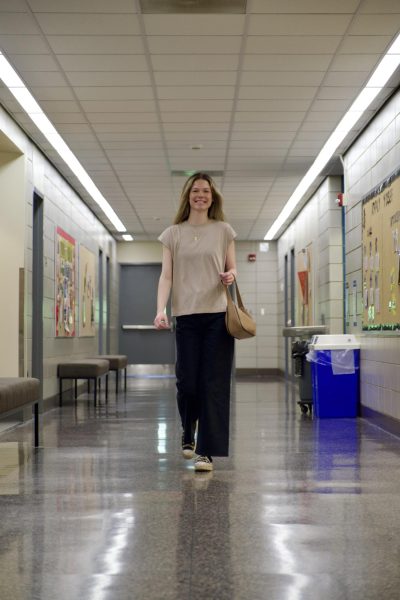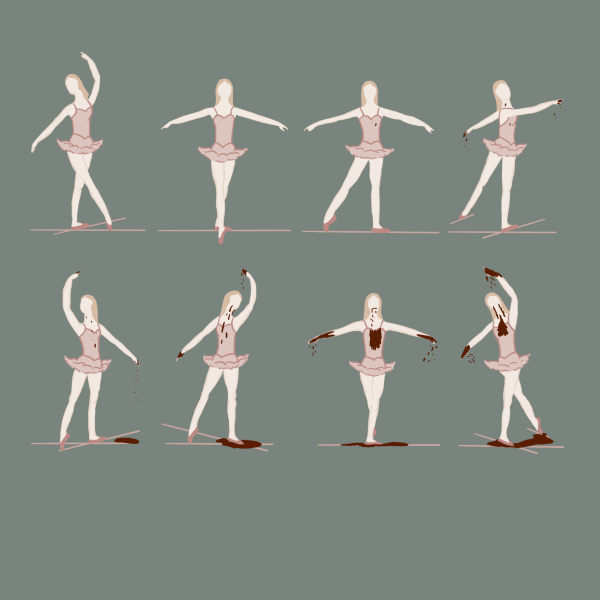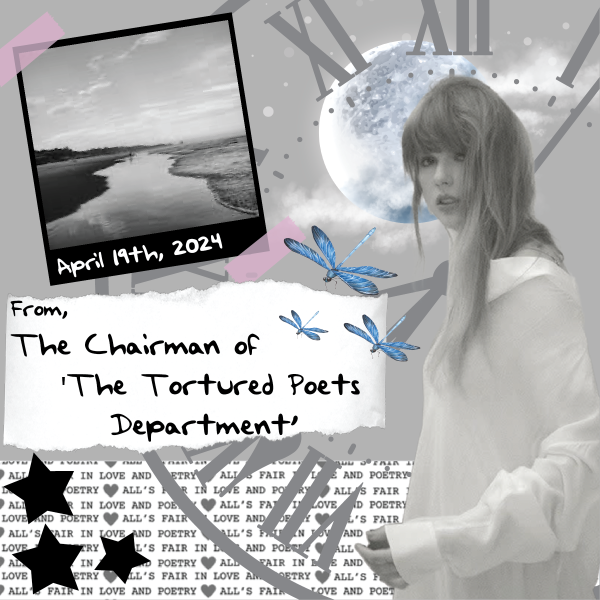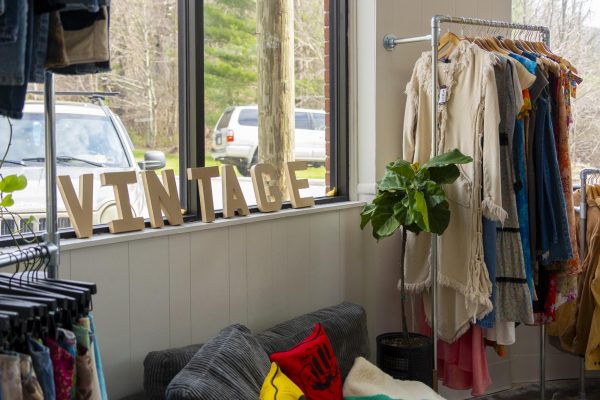Music in motion, one professor conducts three ensembles
Dr. Miller cues sections of the Glee Club, Feb. 21, 2023.
May 12, 2023
Over 80 voices harmonize together in one of Broyhill’s practice rooms. Standing in front of them is one professor conducting a beautiful symphony of sounds with enthusiastic direction and subtle movements, instructing each section to their individual parts in the collective masterpiece.
DaVaughn Miller is an associate professor of music and teaches three ensembles: The Appalachian Chorale, App State Glee Club and App State Gospel Choir.
Miller came to App State full time as an associate professor on tenure fall semester 2022. However, his involvement with the university has stretched over the past 20 years.
Miller arrived in 1999 as a graduate student. He came to get a second bachelor’s degree in music performance and a master’s in choral conducting studying under Steve Hopkins.
When he arrived on campus as a student he worked with the gospel choir at that time as an adjunct, or part-time, professor. Miller did that for almost five years before relocating off the mountain. After his departure from Boone in 2003, he went to Salisbury, North Carolina and took a teaching course there, serving as a director of choral activities for 16 years at Livingstone College. During his time at Livingstone College he was able to travel with his choral group and perform at Carnegie Hall.
He returned to App State to conduct the gospel choir again. He was asked to come back by the dean of the Hayes School of Music at the time, William Pelto.
“I came back because there was a big diversity push on campus. The Gospel Choir was in a rebuild state,” Miller said.
Miller was also working alongside Willie Flemming, a noted African American alum, who retired last year and served as a chief diversity officer in the Chancellor’s Office. Miller came back to App State as a result of the diversity initiative Flemming and Chancellor Evert were pushing at the time.
While Miller was an adjunct at App State, he still served as director of choral activities at Livingstone and commuted in between Salisbury and Boone campuses while residing in Yadkinville.
It wasn’t until this past semester that he expanded beyond solely working with the Gospel Choir and came on staff full time to take on the other ensembles, App State chorale and Glee Club. The professor who had been conducting those ensembles had accepted another teaching position, presenting Miller with an opportunity to step in with his musical experience and conduct all three.
“It is an inspiring job,” Miller said. “And whenever you’re able to work with the creative art of music and its ability to inspire people to do really incredible things, then you know, you’ve landed a really good job.”
Miller said as a professor he is not only helping to shape music but he’s in the business of helping shape minds.
“My goal is never simply to learn a piece of music,” Miller said. “If it doesn’t have a message of quality, I don’t have anything to do with it. Hopefully, we can encourage and inspire young people to take their rightful place in our global society.”
The largest of his ensembles is App Chorale, one of the longest standing ensembles in the High Country, formed in 1975.
Dedy Traver is one of the ensemble’s chartering members and is still involved with the group. Traver said the group was formed after the university took initiative to form a community between students and locals. Those involved with the ensemble would know what was happening in both the community and on campus.
Traver lives in Banner Elk and saw an ad put in the paper for the ensemble. She said most of the original group had sung in choirs and thought singing in such a large group would be a great opportunity and new experience.
“In those early days we had anywhere between 100 and 120 people,” Traver said. “And it’s made up, of course, community people and students and a lot of professors.”
She said one of her favorite memories in the past decades she’s been in the group was performing Bach’s “St John Passion,” a piece the ensemble has performed three different times.
“The first time we did it, Noelle Lovelace directed us and he said ‘This will affect you, the first time you sing it you’ll enjoy it, the second time it will touch your heart, and the third time, it’ll force you to tears because it’s such a big work,’” Traver said. “And that was really true.”
Traver said one of the best things the group ever did was with Linda Larson, when the group performed the Holocaust Cantada in April 2019. The performance featured pieces of music that prisoners in the concentration camps had written and featured guest speakers from the local Jewish Temple.
App Chorale is a soprano, alto, tenor and bass ensemble that consists of over 80 members, including students and members of the community. The group sings standard repertoire, great classics and masterworks.
Traver said the group originally began as an oratorio group, a large musical composition for orchestra, choir and soloists. The group would sing major works like Handel’s “Messiah,”
Mozart’s “Requiem” and “Lord Nelson’s Mass.”
Miller tries to expand that in a lot of different ways. This semester, the ensemble was able to do great choral works, like Beethoven’s “Hallelujah,” and pieces by African American composers that were performed in the Black History Month Concert as part of the Faculty Recital.
Miller said that at his first class teaching chorale, he began with a conversation asking the group why the community still participates in an ensemble such as App Chorale.
“I posed the question because I wanted the students to recognize that the music that they’re creating and the experiences that they’re having, it’s going to affect them their whole life,” Miller said. “These are experiences that you don’t just get rid of, they’re going to always be there.”
Miller said that often the most emotional part of conducting and being involved in such ensembles is the uniqueness of performing and contributing a fragment to a whole piece.
“You’re performing glorious and beautiful music, that to be frank, is only for a time. Once you graduate and you walk across the stage, you only walk away with your vocal part. You only walk away with your bass line or alto part that you’ve memorized,” Miller said. “And so the uniqueness of the situation of all of us being together, creating this wonderful music, should not be taken for granted.”
Miller said he views App Chorale as a fellowship and described the differences between community and fellowship. He said you can live in a community and enjoy your surroundings, but never know your neighbor, but fellowship is the “act of doing life together.”
“When we’re making music, we’re experiencing the beauty of the music that we’re creating. We’re struggling with parts and are coming together wonderfully, while other musical elements are falling flat. You’re going through this wave of emotions, trying to fix things and put things together,” Miller said. “And at the same time, generally care about what’s going on with each other, recognizing that the message in the music touches us all, regardless of age, or ethnicity, or orientation, doing life together. We’re more than just a community choir.”
Miller said it can be difficult at times to create a fellowship with such a substantial group. He said the group must first find commonality, or shared ground, to build from.
“A commonality that we all have are challenges,” Miller said. “Everyone has difficulty. And everyone’s looking for relief.”
Miller said during their first rehearsal he prompted the group to reflect on what calls them to music.
“You do exercises, things of that nature, just to get people to put down their guard, to recognize that we’re all frail in so many ways, and yet we have a commonality, which is a love of music that can give us hope and give us strength when we need it,” Miller said. “The commonality is what works. And we’re all musicians, we hear the same thing.”
Miller does a number of exercises to invoke reflection and abstract thinking about individuals’ musicality.
In another group session he posed the group with an open-ended question and knew he had “opened Pandora’s box” and did so on purpose. He asked the question, “is there morality in sound?” People shuffled in their seats and asked what was meant by ‘“morality” in this instance.
“I mean is there such a thing as a good sound? Or a bad sound?” Miller said. He then went to the piano and struck a chord to which the group responded with synonymous responses, “I think it’s a good sound,” he then played a new note and continued to play chords with different dissonances until the correspondence changed “Well it’s starting to get bad.”
Miller said the conversation began to open up about when the group established that morality is always tied to the composers’ intention. He said it was interesting to watch the discourse open between the different generations in the ensemble and there were times when there was a sense of understanding and agreement, and other times where there was tension in the responses.
“It takes courage to step into that sphere, and to try to hold polar opposites together and stand there. But I see that as my job, to bridge that gap,” Miller said.
Traver said because of the group’s range of age and voices, it creates a strong symphony.
“What is a great range of voices, many of us older people don’t have the strong voices we used to have. But we have a different timbre to our voices and to blend with the younger voices,” Traver said. “And we get to meet some of the students and get to know them.”
Alex Sims is a senior instrumental music performance major and joined the ensemble at the beginning of the semester. He said he was nervous to join because outside of doing plays in elementary school, he had never been a part of a vocal ensemble and is primarily a percussionist.
“You know, normally I’m sitting here hitting drums and everything like that, but to use my voice in a setting where everybody is using their voices and it’s not like a little band or anything like that, it’s really something beautiful,” Sims said.
Miller said the group then began to recognize that although they are perceiving the same thing, everyone has a different interpretation that can be acknowledged and appreciated.
“I can still appreciate you for it. I don’t have to be hostile or disingenuous to you simply because we don’t agree. I can still love and appreciate you. Even though we don’t agree, we can still make beautiful music together,” Miller said.
The ensembles meet every Monday evening for two hours. Though the group is open to the public, those wishing to join must register through the Community School of Music to participate.
“It’s a great opportunity to be a part of something bigger than just myself and the percussion studio,” Sims said. “I’ve made plenty of friends, you know, in App Chorale, and I didn’t think it would happen, I initially thought I was going to be that one guy that was a little isolated because I play an instrument, I don’t normally sing, so it’s different to be a part of a culture that’s different than your own.”
Sims said being a part of the ensemble’s history is “just mesmerizing and something beautiful” and is thankful that he is able to contribute to the legacy of App Chorale.
Glee Club is a tenor and bass ensemble. The Glee Club is both a club as well as a class. They perform a spring concert and fall concert each semester. The club also participates in recruiting for the institution, traveling to different high schools to promote the Hayes School of Music. This is coupled with eclectic performances like singing the National Anthem for a recent App State men’s basketball game.
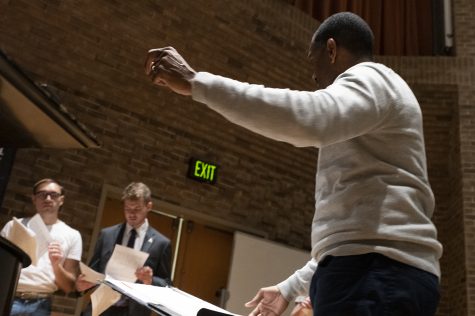
(Darcy Sluder )
Mabeki Mvuendy is a senior exercise science major and the president of Glee Club.
Mvuendy has been in Glee Club for the past four semesters and is also involved in the basketball band, trombone choir, the Steely Pan Steel Band and concert band.
Mvuendy said as an exercise science major, being involved in ensembles allows him to still be involved with music.
“I wanted to learn how to be a better singer and just be more confident with my singing. And it’s another outlet for me to stay involved with music as a non music major.” Mvuendy said.
In their spring concert on May 2, the group performed a piece “Spread Love” by Take 6, an R&B group. Mvuendy said this was the first time the group did an R&B song.
Mvuendy is president of Glee Club. Other leadership roles in the club include a vice president, treasurer and secretary positions.
“I think it’s a really wonderful organization,” Mvuendy said. “I hope anybody interested in singing can join.”
The Gospel Choir is a Christian based choir that sings specifically music from the African American Black church experience.
“The Gospel Choir has a totally different mission, a totally different sound approach to music,” Miller said.
Zakia Hamilton is a freshman music education major and has a background in her church’s gospel choir back home. She said joining the Gospel Choir at App State has helped her adjust to campus and joining “instantly felt like home.”
‘It’s not very demanding. It’s not very, you know, tight hold, it’s very loose and free,” Hamilton said. “And everyone in here has the power and the ability to be themselves. And it’s just an amazing experience and an amazing environment to be in.”
Morgan Williams is a freshman childhood development and family studies major. She said the choir is a place she goes to let go of worries and anxieties.
“I think it’s one of the most encouraging places I’ve ever been, like, this a place where peace resides. It’s a place where God is, it’s a place where you can forget about those anxieties and share this with people in a safe place,” Williams said.
Williams said she previously sang in New York City with her choir and was involved with choir in high school However, she said this is the most unique choir she’s sung in. She said the reason is that “you’re close with everybody” and through the ensemble form cherished friendships.
Fellow ensemble member Alisha Patton is a junior psychology major and was the one who suggested Williams join the choir. Patton was looking for a musical outlet to join since she isn’t a music major and was glad to have joined the choir, an experience she said she wouldn’t have foreseen herself doing just a couple years ago.
“It’s been encouragement and I feel like it gave me assurance that this is where I’m meant to be, and this is where I am meant to grow,” Patton said.
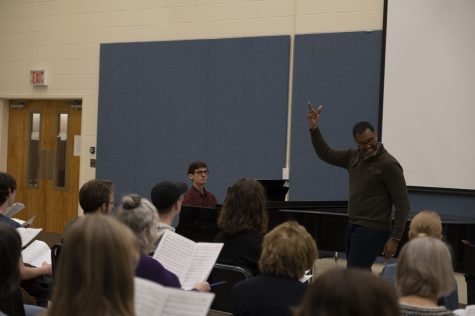
While the other ensembles primarily sight read with scores, the gospel choir performs through rote music learning, teaching students without the music in front of them. Miller said in this music there is call and response, there’s imitation, there’s highly syncopated rhythms, or a temporary displacement of the regular accent, resulting in a change in the listener’s expectations. Miller said there’s a lot of internalization tied to gospel music.
The Gospel Choir identifies as both a class and club, which performs heavily. They had a performance in February in honor of Black History Month. They also performed for the MLK event sponsored by The Office of Intercultural Student Affairs and performed for the Chancellor’s Diversity and Inclusion Award ceremony.
Miller said the ensemble does a little bit of everything and the schedule can be intense at times.
All three ensembles performed for the Hayes School of Music Black History Concert Series. The first two pieces were performed by App Chorale. App Chorale’s large ensemble contrasts against the Glee Club which consists of about 18 voices.
Miller said there are a lot of logistics tied into collaborative performances like that, but he is usually able to navigate, or schedule in a way that there’s not much conflict between the three ensembles.
“I hope, my deepest desire is that App Chorale and Glee Club members have the same thing going on,” Miller said, “We are all struggling to find our way as we deal with life. But if we can sing, we will remain motivated to keep going and trying, oh my goodness, what else is more important than that? And oh, don’t let me talk about the Gospel Choir and the spiritual component tied to what they do, it’s all just beautiful.”

